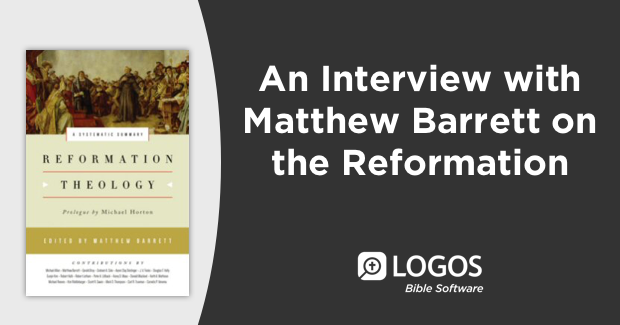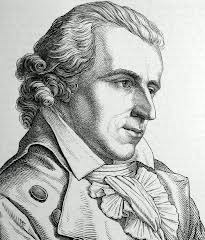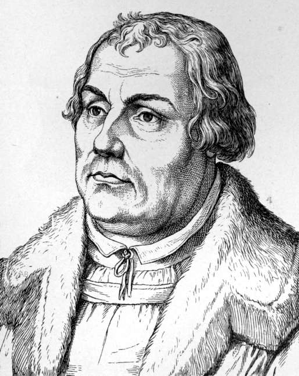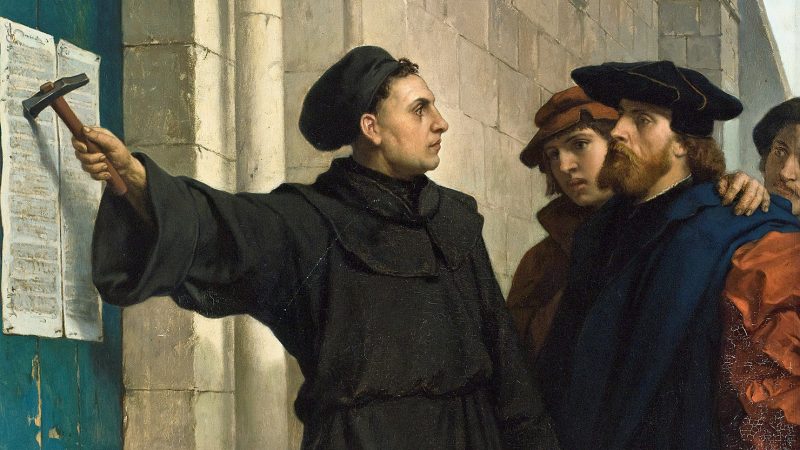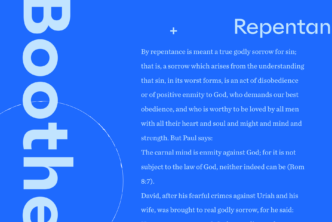In this post, we interview Dr. Matthew Barrett, Lecturer of systematic theology and church history at Oak Hill Theological College in London, and the general editor of Reformation Theology: A Systematic Summary. For the first part of our interview with Matthew, visit the LogosTalk Blog.
You can get Reformation Theology: A Systematic Summary right now for over 25% off the retail price.
Continuing our discussion from our last question, how does man, then, do his best according to Gabriel Biel?
Steven Ozment, in his well-known book The Age of Reform, 1250-1550, insightfully notes how medieval theologians prior to Beil, theologians like Thomas Aquinas, “required the presence of such grace before any positive relationship with God could exist.” By contrast, Biel and Ockham “made the reception of grace a reward for prior moral effort.” They “appeared to free divine acceptance from absolute dependence on infused habits of grace only to make God’s will dependent on the good works man could do in his natural moral state.”
What this meant was that synergism (the belief that God and man cooperate with one another) became fundamental, and in Biel’s case it was a synergism man could even initiate! “Unassisted ethical cooperation now preceded, as a condition, the infusion of grace, which, with subsequent ethical cooperation, won man salvation.” [2] To other late medieval thinkers, and to the Reformers, this smelled like Pelagianism, or Semi-Pelagianism at best.
Did Biel’s view create any problems for the Christian life?
Absolutely. It created a slew of pastoral problems, problems Luther knew personally. For example, how did one know if he did his best? And even if one did his best, how could one really be sure God would not go back on his word and remove justifying grace? After all, he does possess absolute freedom (i.e., voluntarism). Assurance of salvation was not easily gained, no matter how hard one tried to do his best or how perfectly one tried to cooperate with God. This drove Luther to the edge of insanity as he worked day and night to somehow, by means of his own works of merit, achieve assurance. It never came, at least not this way.
What was Luther’s response to this late medieval view? Did he also affirm a synergism?
The Reformers kicked against this entire system, Biel in particular. And you can see early signs of this. Most likely, Luther had inhaled Biel’s theology from his professor John Nathin, who very likely did his doctoral studies under Biel at Tübingen. When Luther begins his lectures on the Psalms, it is Biel’s assumptions that are felt everywhere. “The teachers correctly say,” Luther comments, “that to a man who does what is in him God gives grace without fail.”[3]
But then Luther started to lecture on Romans and his rebellion against Biel starts to show, even if it is not fully mature yet. Luther argues that man is not active but passive, being the recipient of divine grace rather than doing what lies within (i.e., doing one’s best). But the real explosion came in 1517 in a set of theses (no, not the 95 theses!) now labelled Luther’s Disputation Against Scholastic Theology. Luther is adamant that man is a “bad tree” and “can only will and do evil.” It “is false to state that man’s inclination is free to choose between either of two opposites. Indeed, the inclination is not free, but captive.”[4]
Did Luther also change in his view of justification as a result?
Over the years, Luther would eventually arrive at his more mature understanding of justification as well. At the time of his Disputation Against Scholastic Theology, Luther had moved out of the school of Biel and the via moderna and instead found an ally in Augustine. Though Augustine would give God’s grace all the credit in man’s conversion, still, Augustine assumed that justification was the process of being made inherently righteous. Here Luther took issue with Augustine, believing that justification is not a moral renewal by means of an infusion of grace but a divine declaration that resulted in a changed status.
Though historians debate when Luther came to this new understanding, I think it was around 1520/21 that Luther realized that justification did not involve some type of healing substance or inward moral quality but instead referred to an alien, external righteousness and status being credited to the sinner by faith alone. Not only did Christ pay the penalty for sin on the cross, but his perfect life of obedience to the law is imputed as a gift to those who trust in Christ alone. This was, for Luther, the great exchange: Christ took our guilt; we have received his righteous status. The result: we stand before God not guilty but just in his sight.
What consequences did Luther’s new understanding of justification have for the Christian life?
Naturally, Luther’s view of Christian assurance changed entirely. If it is an alien righteousness that we receive by grace alone through faith alone, then our confidence of heaven rests not upon our own merit but upon the merit of Christ alone. The “afflicted conscience,” Luther advised, “has no remedy against despair and eternal death except to take hold of the promise of grace offered in Christ, that is, this righteousness of faith, this passive or Christian righteousness.”
Rather than trusting in one’s own righteousness through the Law (what Luther labelled “active righteousness”), one should instead look to “passive righteousness,” that is, the righteousness of Jesus. “Thus I put myself beyond all active righteousness, all righteousness of my own or of the divine Law, and I embrace only that passive righteousness which is the righteousness of grace, mercy, and the forgiveness of sins.” The righteousness of Christ, says Luther, is not a righteousness we “perform but receive,” it is not one we “have but accept, when God the Father grants it to us through Jesus Christ.”[5]
What a load, what a burden, was lifted off of Luther’s shoulders when he came to see this for the first time!
For the first part of this interview, visit the LogosTalk Blog. For a limited time, Reformation Theology: A Systematic Summary is over 25% off the list price. Place your order soon—the price goes up on June 16.

[1] Gabriel Biel, “The Circumcision of the Lord,” in Heiko Oberman, Forerunners of the Reformation: The Shape of Late Medieval Thought Illustrated by Key Documents (Philadelphia: Fortress, 1966), 173. Emphasis added.
[2] Steven Ozment, The Age of Reform, 1250-1550: An Intellectual and Religious History of Late Medieval and Reformation Europe (New Haven and London: Yale University Press, 1980), 41-42. Emphasis added.
[3] Martin Luther, First Lectures on the Psalms II, in LW 11:396.
[4] Martin Luther, Disputation Against Scholastic Theology, 1517, in LW 31:9 (theses 4, 5).
[5] LW 26:5-6.

